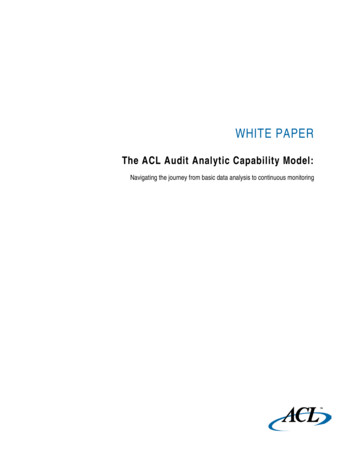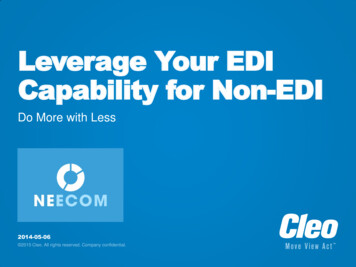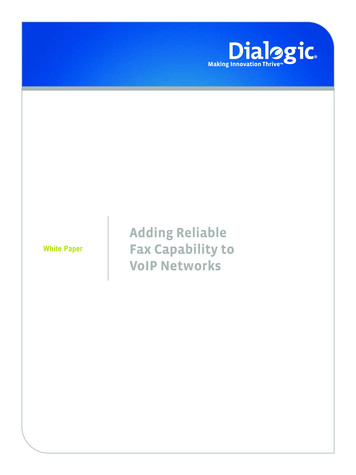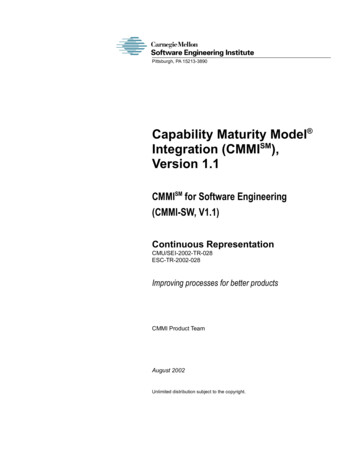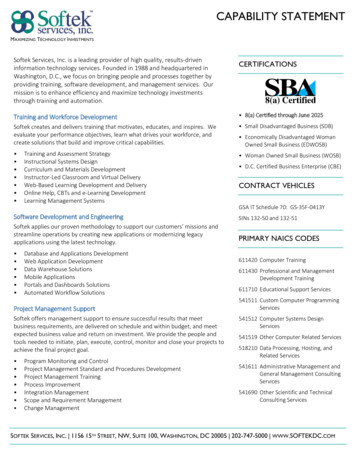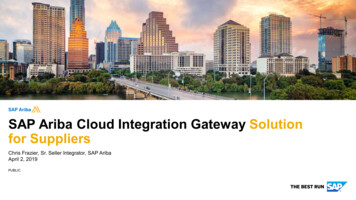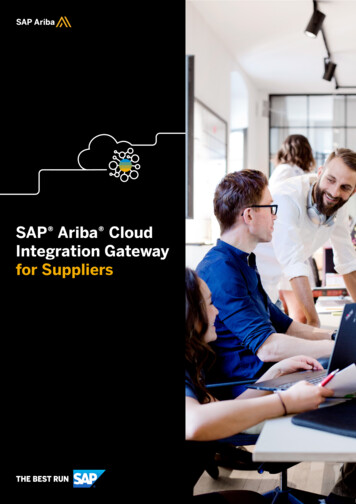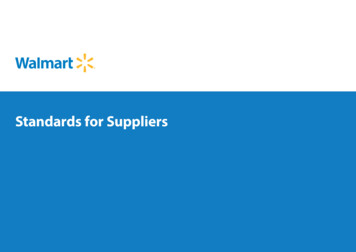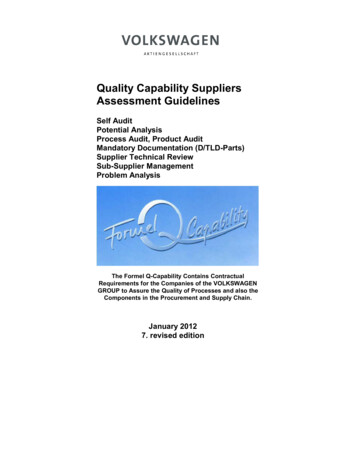
Transcription
Quality Capability SuppliersAssessment GuidelinesSelf AuditPotential AnalysisProcess Audit, Product AuditMandatory Documentation (D/TLD-Parts)Supplier Technical ReviewSub-Supplier ManagementProblem AnalysisThe Formel Q-Capability Contains ContractualRequirements for the Companies of the VOLKSWAGENGROUP to Assure the Quality of Processes and also theComponents in the Procurement and Supply Chain.January 20127. revised edition
1.Edition-19912.Edition-January 19943.Completely Revised Edition-January 19974.Completely Revised Edition-April 20005.Completely Revised Edition-January 20056.Completely Revised Edition-August 20097.Completely Revised Edition-January 2012This Document will only be available to Suppliers in the current version electronically through theVolkswagen Group B2B-Platform under www.vwgroupsupply.com.Up to date valid and mandatory Documents are located at the aforementioned B2B Platform.The German-language edition of the Formel Q Capability is binding.Property of VOLKSWAGEN AGDuplication, usage and distribution are only permitted to Suppliers within the Supply Chain ofVOLKSWAGEN GROUP.The Document is copyright protected. All rights are with VOLKSWAGEN AG.Issued:VOLKSWAGEN AGGroup Supplier Quality AssuranceGroup Quality Supplier AuditLetterbox 1467/0, 38436 WolfsburgGermany
ForewordForewordIncreasing Customer Requirements, Global Competition and Cost Pressures are demanding fullyMatured Products for Series Production launches, and robust Production Processes for failureprevention along the Supply Chain. In order meet this challenge we have to work together in orderto succeed with our Products in the market and to secure our future success.Our Suppliers and their Supply Chain are of high importance.Each Process is to be designed in a preventive way to be robust and stable to ensure, prior toSeries Production launch, that every Component and also the whole vehicle will meet theVOLKSWAGEN Group Quality requirements. Only working in this way will we ensure that the ZeroDefect-Target will be met.Customer Satisfaction is especially the focus of attention.To eliminate any launch issues on new Models, it is of the utmost importance to control thematuration grade within the Supply Chain.This present edition 7 demonstrates a completely revised content, updated and further developedreferencing to VDA 6 Part 3.This Formel Q Capability is the guideline for the Evaluation of the Supplier Quality Capability forVOLKSWAGEN Group (1st Tier Suppliers) including their Supply Chain (n tier suppliers). Previousresults according to earlier requirements will remain valid and will not be re-calculated/adjusted tonew requirements/standards, as long as no new assessments take place during a re-visit at thelocation.As a Direct Supplier you have the obligation to ensure that the VOLKSWAGEN Group requirementswill be understood and implemented along the whole Supply Chain.The Formel Q Capability for Direct Suppliers and their Sub-Suppliers is obligatory for allComponents and Materials which will remain on the vehicle. It is valid for all brands of theVOLKSWAGEN Group as well as for all Worldwide Associated Companies. To improve thecommunication you will find the multilingual information and the VOLKWAGEN Group Documentson the VOLKSWAGEN B2B Platform under www.vwgroupsupply.com.As a Supplier you are responsible to abide by the VOLKWAGEN Group requirements and mustalso ensure the implementation within the overall Supply Chain.This revised addition will take effect from the day of official publishing.Wolfsburg, January 2012Page 3 of 27
ContentsContentsForeword3Contents4Quality Management Agreements for Purchased Parts6Supporting Documents71 Introduction81.1 Purpose1.2 Requirements for Quality Capability Assessments1.3 Responsibilities for QM-Systems and Audit Results1.4 Assessment of Quality Capability1.5 Rating Results and Follow-up Activities1.6 Scope of the Formel Q Capability in the Product Life Cycle88999102 Customer Expectations / Escalation / Cost Reclaiming Process112.1 Customer Expectations2.2 Cost Reclaiming Process11113 Supplier Self Audit (SL)123.1 General3.2 Conducting3.3 Escalation1212124 Product Audit134.1 General4.2 Conducting and Actions4.3 Fault Classification, Decisions, Actions4.4 Reporting Obligations, Self Notification131314145 Potential Analysis (POT)155.1 Goal and Purpose5.2 Preparation5.3 Process5.3.1 Catalogue of Requirements5.3.2 Evaluation5.3.3 Report and Improvement Programme5.3.4 Approval of Manufacturing Location151515151515156 Process Audit (VA)166.1 General6.2 Process Audit during Series Production6.3 Evaluation6.4 Up-grading Criteria16161616Page 4 of 27
Contents7 Quality Verification Audit for D/TLD Parts (D/TLD)177.1 General7.2 Definition of Product Groups / Parts Selection7.3 Evaluation of Individual Questions / Audit Results7.4 Audit Report / Improvement Programme7.5 Identification Codes for Technical Documents7.5.1 TLD-Identification Code7.5.2 System of Identification at the Supplier171818181919198 Supplier Technical Review (TRL)208.1 General8.2 Reasons for Conducting a TRL8.3 Notification8.4 Conducting8.5 Evaluating8.6 Report2020202021219 Sub-Supplier Management (ULM)229.1 Goal and Purpose9.2 General9.3 Changes in the Supply Chain22222210 Problem Analysis (PA)2310.1 General10.2 Conducting / Process10.3 Escalation Principle23232311 Documents and Records of Supplier Visits24Appendix25Page 5 of 27
Quality Management Agreements for Purchased PartsQuality Management Agreements for Purchased PartsThe Customer specific Quality Requirements for the VOLKSWAGEN Group are specified in theFormel-Q Documents as shown below.Module:“Philosophy“Formel QPrimary Agreement as Part ofthe ContractFormel Q-konkretFormel QCapabilityFormel QCapabilitySoftwareQuality CapabilityAssessment Criteria Self Audit Potential Analysis Process Audit Documentation Tech. Review Sub-SupplierManagement.CQuality CapabilitySuppliersAssessment GuidelinesSoftware Potential Analysis Self Assessment Assessment Code Analysis Problem AnalysisFormel QNew PartsMaturationGradeQualificationProgramme New parts(QPN)Assessment System andsupporting Processes2 Day Production RunSupplier Assessmentfor Continuous ImprovementQuality, Service, Price, Logistics, Environment and InnovationThe present Brochure describes this ModuleDiagram: Quality Management Agreements Purchased PartsPage 6 of 27
Quality Management Agreements for Purchased PartsSupporting DocumentsGroup Quality Documents on www.vwgroupsupply.com: Actual information about the requirement of Field Rejects for the brand VOLKSWAGEN PKWFormel Q-KonkretFormel Q-Capability SoftwareFormel Q-New Parts IntegralVOLKSWAGEN Group Form: Supplier Self InformationFormel Q-Capability Process Audit (Appendix)Formel Q-Capability TRL Questionnaire (Form)Formel Q-Capability D/TLD Questionnaire (Form)Formel Q-Capability Sub-Supplier Management (ULM) Questionnaire (Form)These Documents and Forms are available in electronic format on the B2B-Platformwww.vwgroupsupply.com.Group Standards Index on www.vwgroupsupply.com (FE Online Normentexte): VW 60250 High Tensile Fasteners and similar Bolting Components; Technical Supply termsVW 10130 Machine Capability Studies for Measurable CharacteristicsVW 10131 Process Capability Studies for Measurable CharacteristicsVW 10119 Inspection Process Capability – consideration of Measuring Inaccuracy on InspectionProcessesVW 99000 Interdisciplinary Requirements for Services provided for the Parts DevelopmentVW 10540 Identification Marks/ Manufacturer Code on Vehicle ComponentsVW 01064 Sub-Component Identification – Codes on Vehicle ComponentsVW 01155 Bought-In Components, approval of Initial Deliveries and Changes VDA-Volumes and Automotive Standards on www.vda-qmc.de: VDA-Volumes „Quality Management within the Automobile Industry“ as well as „The mutualQuality Management within the Supply Chain“ (Volumes of the Association of the AutomobileIndustry)ISO/TS 16949, alternative VDA 6.1 Supplementary Guidelines: ISO 19011 Guideline for the auditing of Quality Assurance Systems – conducting auditsAdditionally, the Technical Standards and VOLKWAGEN Standards applicable for Products arevalid as well e.g. min. Life Time of Products, Legal, Regulations, Guidelines etc. are applicable.Page 7 of 27
1 Introduction1 Introduction1.1 PurposeThe Evaluation System for the Quality Capability of VOLKSWAGEN Group Suppliers is based on aQuality Standard for the Automotive Industry that was developed by the VDA expert group.Then the QM-System according to ISO/TS 16949, alternatively VDA 6.1, is the basis for Suppliersof Production Material, and the fulfilment of the Requirements must be proven to theVOLKSWAGEN Group by an IATF recognised certificate (third party).In addition to the Quality Management System certificate, a Process / Product Audit that iscomparable to VDA 6.3 / 6.5 are used for Special Product Groups to assess the Quality Capabilityof Suppliers. Apart from the basic requirements of a QM System, it also considers the SpecialProduct-related requirements of VOLKSWAGEN Group Purchased parts, the Production Process,and Special Technical Inspection Requirements.Process Audits relevant for the Evaluation of Quality Capability will be exclusively conducted byAuditors of the VOLKSWAGEN Group or by Auditors from Associated Enterprises.The Evaluation conducted by VW Group Auditors provides the Assessment and Selection ofApplicants / Suppliers prior to sourcing decisions. Further evaluation will be conducted during thephases of Product and Process Development as well as during the Series Production Process.For further information for Supplier Evaluation see Formel Q Konkret.1.2 Requirements for Quality Capability AssessmentsThe Quality Capability of selected Suppliers and their Sub-Suppliers, must always be proven beforea Purchase Order for a New Part (Forward Sourcing) or a Series Part (Global Sourcing) is placed.The proof can be submitted by Self-certification and Audit of the Suppliers plus SupplementaryAudits carried out by the responsible departments in the VOLKSWAGEN Group, using the ProcessAudit / Potential Analysis.New proof of the Quality Capability is also required if a New Product according to the Product GroupCatalogue should be delivered, if previously no audit of the Quality Capability has been performedby the VOLKSWAGEN Group.VOLKSWAGEN Group Purchasing must ensure that the intended supplier has already beeninformed of all VOLKSWAGEN Group criteria and requirements and has access to the B2BSupplier Platform (www.vwgroupsupply.com),they are to be referred to by the supplier forcalculation of the quotes. With the release of the access to the B2B-Supplier Platform, the Suppliermust complete and maintain the Supplier database for each DUNS-number.Prior to sourcing, a positive rating (“A” or “B“) from the VOLKSWAGEN Group related to the QualityCapability of the Suppliers Location and the Products Groups must be available. A Supplier with“C”-Rating (not Quality Capable) will not be considered for nomination. The Supplier is obliged toreach “A” Quality Capability Rating before SOP.According to Formel-Q Konkret the supplier is responsible to inform any changes within the processchain.Page 8 of 27
1 Introduction1.3 Responsibilities for QM-System and Audit ResultsThe Supplier is responsible for providing all results from Certification/Auditing, as well as SelfAudits, to VOLKSWAGEN when requested. Also to be presented are documents from ImprovementProgrammes already implemented.If ISO/TS 16949 or alternatively VDA 6.1 certification is not awarded to the Supplier, a confirmedplanned Certification date is to be advised. Further progress is to be coordinated in detail with theVOLKSWAGEN Group Quality Assurance Audit Management.The coordination and communication for required follow-up actions, e.g. pursuing ImprovementProgrammes, takes place via VOLKSWAGEN Group Supplier Quality or the individual Brands/affiliated Companies Audit Departments.1.4 Assessment of Quality CapabilityThe Total Assessment of the Quality Capability comes from individual results of each ProductGroup for: Self Audit Process Audit with Product Audit Evaluation of the Supply Chain,e.g. for outsourced Process Steps and Project related determination of Q Capability through Product Specific and Project Specificrisk estimations.The procedure for the Determination and Assessment of the Quality Capability is represented in thefollowing chapters of this document.1.5 Rating Results and Follow-up ActivitiesBased on Audit results the Supplier is responsible for Analysing discrepancies, to define suitableCorrective Actions and to schedule the Implementation with stated responsibilities. It is expectedthat the Supplier will initiate the required activities rapidly, effectively and sustainably, and as wellimplementing the Improvement Programme rapidly and verifies the Effectiveness and Sustainabilityof such Actions.After implementation of the Improvement Programme, a Self Audit of the Supplier is required toverify the sustainable efficiency of the Programme.A new Evaluation and rating can be conducted when the Quality Performance is not acceptable oras a preventive measure.Page 9 of 27
1 Introduction1.6 Scope of the Formel Q Capability in the Product Life CycleSourcingSupplier SelectionSOPProduct / ProcessDevelopmentSeries ProductionSLSL (Self Audit)ULMULMULM (Sub-Supplier Management)POTVAVAD/TLDD/TLDPAPATRLDiagram: Formel Q Capability Product Life CyclePAPOTSLD/TLDULMVACustomerService (AfterSales)Problem AnalysisPotential AnalysisSelf AuditQuality Verification Audit for D/TLD PartsSub-Supplier ManagementProcess Audit (including Product Audit)Page 10 of 27
2 Customer Expectations / Escalation / Cost Reclaiming Process2 Customer Expectations / Escalation / Cost Reclaiming Process2.1 Customer ExpectationsThe VOLKSWAGEN Group requires it’s suppliers to achieve an ‘’A’’ Rating according to t
Formel Q-Capability Sub-Supplier Management (ULM) Questionnaire (Form) These Documents and Forms are available in electronic format on the B2B-Platform www.vwgroupsupply.com. Group Standards Index on www.vwgroupsupply.com (FE Online Normentexte): VW 60250 High Tensile Fasteners and similar Bolting Components; Technical Supply terms4,8/5Page Count: 27File Size: 315KB
